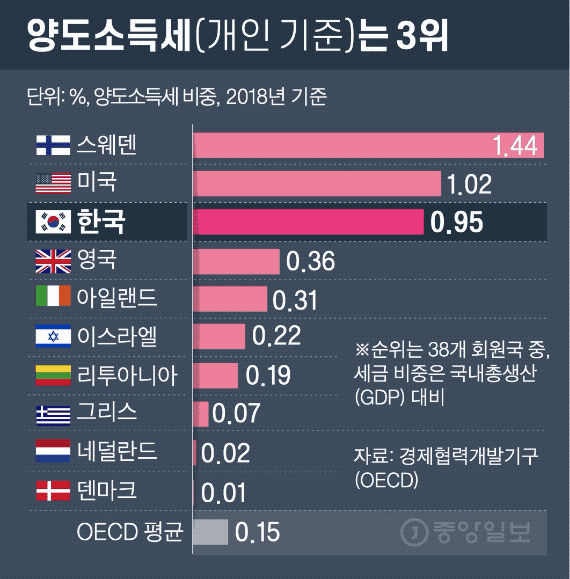It was found that the tax paid for holding and trading real estate in Korea is the third largest among OECD member countries.
After Britain and France… No. 1 in transaction tax
![Capital gains tax (personal basis) is the third place graphic image. [자료제공=경제협력개발기구(OECD)]](https://i0.wp.com/pds.joins.com/news/component/htmlphoto_mmdata/202102/16/9935ce5e-9e3f-4367-bc9c-3080faaba641.gif?w=560&ssl=1)
Capital gains tax (personal basis) is the third place graphic image. [자료제공=경제협력개발기구(OECD)]
According to Rep. Gyeong-jun Yoo on the 15th, domestic real estate-related taxes (holding tax, asset transaction tax, capital gains tax, etc.) in 2018 amounted to 4.05% of nominal gross domestic product (GDP). Only two countries, the UK (4.48%) and France (4.43%), had a higher ratio of real estate tax to GDP than Korea. The United States, which is known to pay a lot of real estate ownership tax, ranked fourth with 3.97% of real estate tax. Even compared to the average of the real estate tax share of 38 OECD member countries (1.96%), Korea was more than twice as high. 〈The JoongAng Ilbo, page 8 of January 28〉
![Graphic image of Korea's asset-trading tax, surpassing advanced countries. [자료제공=경제협력개발기구(OECD)]](https://i0.wp.com/pds.joins.com/news/component/htmlphoto_mmdata/202102/16/736492fb-9410-47df-8be8-4b312d482d85.gif?w=560&ssl=1)
Graphic image of Korea’s asset-trading tax, surpassing advanced countries. [자료제공=경제협력개발기구(OECD)]
Korea’s transaction tax burden was found to be particularly large. According to Assemblyman Yoo, the size of the asset transaction tax in Korea in 2018 was 1.89% of GDP, ranking first among OECD member countries. The overall average (0.45%) was more than 4 times. In addition, Korea’s capital gains tax (individual basis) to GDP was ranked third with 0.95%. The share of inheritance and gift tax (0.39%) was fourth. The low proportion of taxes is the’real estate tax’ (holding tax, comprehensive real estate tax + property tax). The proportion of Korea’s real estate property tax in 2018 estimated by U.S. was 0.82% of GDP, ranking 18th among OECD countries.

Deepening asset polarization. Graphic = Kim Eun-kyo [email protected]
However, it is estimated that the proportion increased to 1.2% last year, exceeding the OECD average (1.07%). Wealth inequality has grown worse. The’real estate Gini coefficient’, which Congressman Yoo estimated based on data from the National Statistical Office, rose from 0.491 in 2017 to 0.513 last year. The closer this number is to 1, the higher the degree of inequality.
Sejong = Reporter Kim Namjun [email protected]
